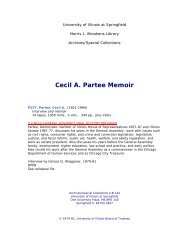harold a. katz memoir volume 1 - University of Illinois Springfield
harold a. katz memoir volume 1 - University of Illinois Springfield
harold a. katz memoir volume 1 - University of Illinois Springfield
Create successful ePaper yourself
Turn your PDF publications into a flip-book with our unique Google optimized e-Paper software.
<strong>of</strong> the line. The same maitre d' was standing in front <strong>of</strong> the door. He immediately recog-<br />
nized Mrs. Roosevelt, whom he greeted exhuberantly, saw that I was her guest, and stood<br />
by silently, as I followed her to her table with a look <strong>of</strong> victory on my face. I am probably<br />
the only man ever permitted during that era to have dinner in the main dining room <strong>of</strong><br />
the Hotel Commodore in direct violation <strong>of</strong> their dress code. I could not resist rubbing it<br />
in as I walked by, muttering to the maitre dl in a subdued but triumphant tone, "Presidential<br />
party!"<br />
Q: Did you continue then through the years to meet with Mrs. Roosevelt occasionally?<br />
A: On rare occasions. She once came to Nashville, and I saw her for a few minutes. I once<br />
dropped her a note. Mrs. Roosevelt sent me a picture, an autographed picture, that I hung<br />
and kept nearby because I admired her so much. My view <strong>of</strong> her was well expressed by<br />
Harry Truman who called her the First Lady <strong>of</strong> the World.<br />
There was a period later in Nashville when things on the racial front got quite heated. It<br />
became Ku Klux Klannish. I dropped a note to Mrs. Roosevelt commenting to her about the<br />
tenseness <strong>of</strong> the racial situation. She sent me back a very brief note which said in essence<br />
that she thought I ought not to exacerbate it, advising me to proceed with considerable cau-<br />
tion.<br />
Q: Now, you went on to Washington from New York then.<br />
A: Yes, I did. I went on to Washington from New York and then had the visit at the White<br />
House.<br />
On another occasion I went to a student institute at the <strong>University</strong> <strong>of</strong> Virginia. They had<br />
a World Affairs Institute every year at that time where they would bring distinguished<br />
people in international relations to Charlottesville. Outstanding scholars in international<br />
affairs would lecture to students from all over the country. I got into that through Dr. Flem-<br />
ing, our political science faculty member interested in international relations. The speeches<br />
and sessions made the few days at Charlottesville very exciting. This was in the summer<br />
<strong>of</strong> 1941 - before the Campobello experience.<br />
Q: How did you come to go to that World Affairs Institute?<br />
A: Through Dr. Fleming. He encouraged me to attend.<br />
Q: Was it at your own cost?<br />
A: Yes, it was at my own cost. By this time my parents had enough money to send me.<br />
It was on the way to Washington, and my parents wanted me to visit my brother who was<br />
nearby.<br />
Q: Do you recall any others from the South that were at the meeting that you talked with?<br />
A: My friends, William Sanders and Bob Cook. We drove up together from Vanderbilt. I<br />
am sure that there were many others from Southern universities, but I did not know them.<br />
SESSION 3, TAPE 5, SIDE 3<br />
Q: What was the sense there at Vanderbilt or during those years <strong>of</strong> the coming war? It<br />
was pretty hot by 1939.<br />
A: One <strong>of</strong> my favorite pr<strong>of</strong>essors, Pr<strong>of</strong>essor Fleming, was an authority on the League <strong>of</strong><br />
Nations, and a great believer in collective security, and he had quite an impact at

















